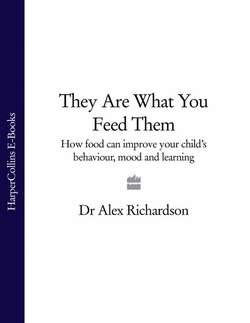Читать книгу They Are What You Feed Them: How Food Can Improve Your Child’s Behaviour, Mood and Learning - Dr Richardson Alex - Страница 58
Summary
Оглавление1. Labels like dyslexia, dyspraxia, attention deficit hyperactivity disorder (ADHD) and autism can be both helpful and unhelpful. These diagnoses are descriptions, not explanations—but they can provide reassurance and should open the way to effective help.
2. These conditions affect around 20 per cent of school-age children in the UK to some degree, although more boys than girls are affected.
3. Most of the ‘core features’ used to define these kinds of behavioural and learning difficulties simply reflect extremes of normal individual differences.
4. There are substantial overlaps between all of these conditions. Children who only show symptoms of one of them are the exception, not the rule.
5. Genetic factors play some part in a child’s risk developing ADHD, dyslexia and autism, but environmental factors—including diet—are equally if not more important, and much easier to change.
6. Any child’s behaviour and performance are only the ‘tip of the iceberg’. These are affected by what that child is thinking and feeling, his emotions and, fundamentally, his physiology. Diet works at this fundamental level.
7. Our brains often reflect what’s going on in our guts—and the two are closely linked by the immune system and other chemical messenger systems.
8. Children with behavioural and learning difficulties often show other features and physical health symptoms (including allergies) that indicate digestive and nutritional imbalances.
9. A healthy balance of gut flora and the right dietary fats (such as omega-3) are needed for good digestion and a well-functioning immune system. A healthy, well-balanced diet (and exercise) can help to ensure this.
10. Dietary approaches should never be regarded as the only way to manage behaviour and learning difficulties, but good nutrition is fundamentally important and may enhance the effectiveness of other therapies.
